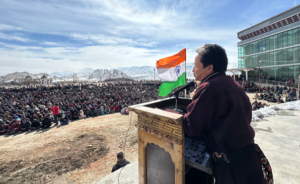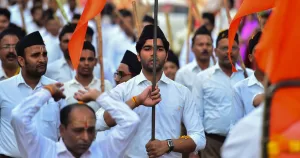Prime Minister Narendra Modi’s government in India often claims that its actions are unprecedented—that no government in India’s history has been bold enough to do what it does. Most of the time this is, to put it mildly, an exaggeration. But on Monday, they certainly went far beyond what any previous Indian government has done about the troubled state of Jammu & Kashmir. And that’s a big, big problem.
After a tense and terse build-up—during which a major pilgrimage was canceled, the Kashmir Valley was flooded with soldiers and Kashmiri politicians were arrested—Modi’s right-hand man, Home Minister Amit Shah, announced a set of Kashmir-related legal changes in Parliament. In essence they scrap the special status promised to Jammu & Kashmir when it became part of India seven decades ago; divide the state into two; and reduce the power of elected state politicians to pass laws and control the local police. Jammu & Kashmir will no longer have the rights and privileges of a state of the Indian Union, but instead be a Union Territory, with its laws requiring the assent and permission of the government in New Delhi.
Perhaps these changes will not be upheld by India’s Supreme Court. But, if they are, they would indeed be unprecedented. No Indian government has ever seriously wanted to disturb the delicate legal balance that underlies New Delhi’s claim to the Valley. Moreover, there is no doubt they will inflame separatist sentiment in Kashmir. Its residents are already simmering with anger at decades of repression and a constant military presence in their homes and villages. Now, in their eyes, their sole claim to autonomy and identity has been taken away.
What will these changes mean for Kashmir’s future, and India’s? If implemented fully, one big thing will change: Previously, only those from Kashmir could own land there; now the Valley could be flooded with settlers from outside. India has never played the demographic card—used its overwhelming numbers elsewhere to render native Kashmiris’ demands moot, the way that Beijing has by urging Han Chinese to migrate to Tibet and Xinjiang.
Whether Kashmir will end up looking like those restive, semi-autonomous provinces, or more like the West Bank—with armed settlers living in highly protected colonies amid a larger, disenfranchised population subject to arbitrary justice—is not clear at the moment. Those are, however, the most likely options.
Neither would be in any way a positive for India. Whatever else, this country still aspires to be a liberal democracy respected worldwide, and it won’t be if it creates a Xinjiang or a West Bank in Kashmir, rendering people second-class citizens or putting them in camps. Nor do India’s people and economy have the resources to deal with a sustained, angry insurgency.
Worse, many other restive parts of India—with shrinking populations, as opposed to the growing ones in Modi’s heartland of the north and west—will be given fresh reason to fear this demographic bludgeon. Already various states are designing laws meant to deny employment to “outsiders.” The prospect of large-scale settlement would enrage sub-nationalists elsewhere in India, hardly a desirable outcome from New Delhi’s point of view.
The reasons that Modi’s government has done this have, therefore, nothing to do with India’s national interest. It’s all about pushing forward his Bharatiya Janata Party’s deeply rooted ideals of Hindu majoritarianism. Kashmir is India’s only Muslim-majority state and its autonomy is offensive to the BJP and its ideological fellow-travelers. Israel—which they see not as a multi-ethnic democracy, but as a militant religio-nationalist state that knows how to treat Muslims—has always been their ideal.
It’s also a simple electoral calculation: whenever there is tension between Hindus and Muslims, the BJP does better in elections. The economy is visibly struggling and, like other populist–authoritarians, Modi may well see this as a good moment to double down on majoritarian identity politics.
The tragedy for Kashmir and India is that there is likely to be no real pushback against this decision. Modi’s parliamentary majority in this year’s general elections was large enough to have cowed the political opposition in New Delhi. The media has been muzzled or bought off, and independent institutions have had their wings clipped. The Kashmiris’ most popular leaders are far from sympathetic spokesmen: those who are not corrupt, compromised or dynasts are largely al-Qaeda-loving Islamist fundamentalists.
Nor will there be any real pressure from abroad, at least to begin with. Donald Trump loves authoritarians more than liberal democrats anyway. And has anybody stepped up for Xinjiang? No, instead the world has cravenly kowtowed to Beijing. Then why should Modi worry that anyone will isolate India if it treats Kashmir similarly?
The only people who might object are those who recognise the road that this takes India down—one which undermines its Constitution, strains its union and brutalises its people. But those voices are few and stifled in India today.
(Mihir Sharma is a Bloomberg Opinion columnist. He was a columnist for the Indian Express and the Business Standard.)




